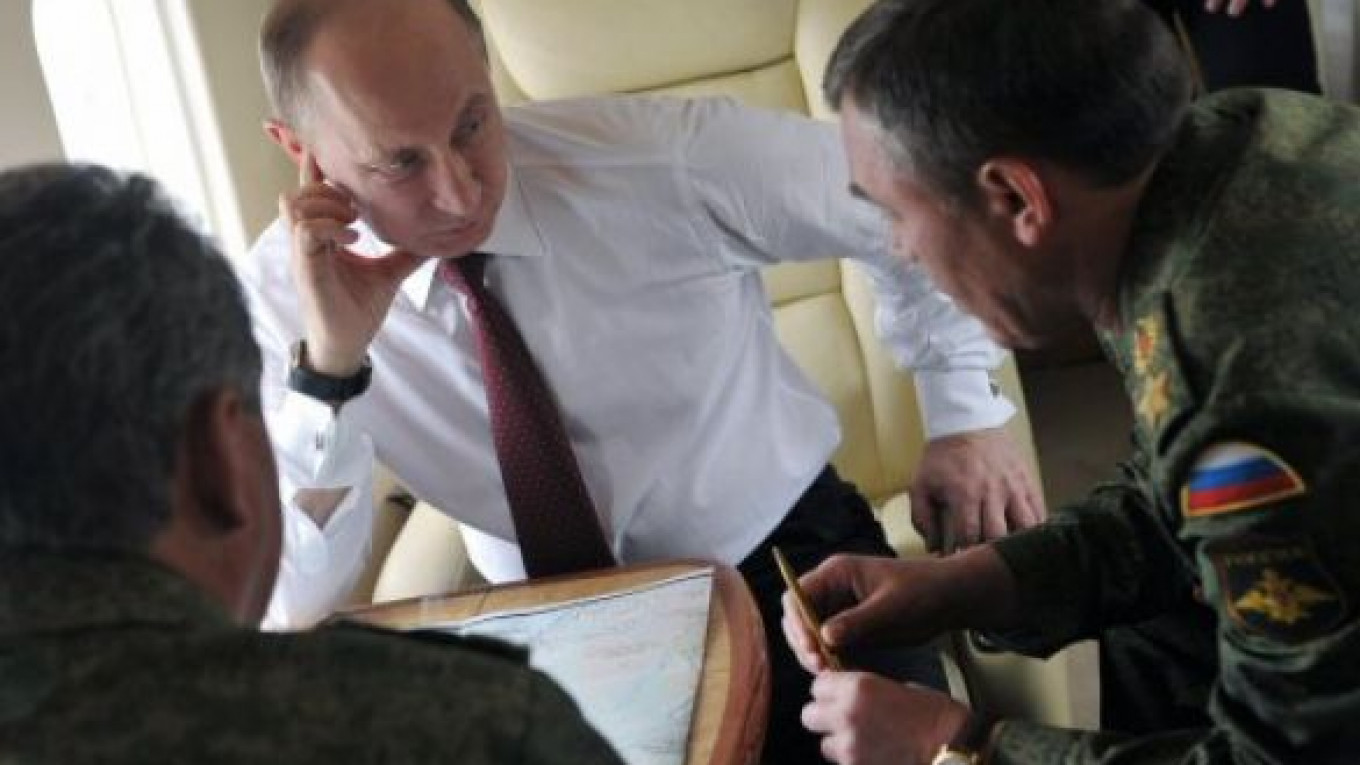President Vladimir Putin observed the Armed Forces perform the largest military exercises since Soviet times Tuesday, the latest in a series of surprise drills around the country this year aimed at examining the army's combat readiness following military reforms.
The surprise maneuvers in the Far East, which started late Friday following an order from Putin earlier that day and will last at least until Wednesday, involve up to 160,000 military personnel, around 1,000 tanks and armored vehicles, 130 aircraft and 70 naval ships.
The Defense Ministry said the drill is the largest in the country's post-Soviet history, saying it would test the ability of troops to perform urgent movements over a distance of more than 3,000 kilometers.
In explaining the scale and surprise element of this year's drills, military analysts cited a variety of factors, including growing state expenses on defense, the potential of Russia's involvement in a military conflict, and Russia's economic and political interests.
“We are not threatening anyone, but we are showing that Russia has to be taken into account,” said Igor Korotchenko, editor-in-chief of the magazine National Defense, who watched the drills on Sakhalin Island on Tuesday.
Earlier this month, Russia participated in China's largest-ever military exercises with a foreign partner off the port of Vladivostok, drawing the attention of neighboring Japan, which has a tense relationship with China.
On Monday, Japan scrambled fighter jets after noticing three Russian military planes near its airspace over the Sea of Japan, NHK World reported. Seven Russian warships also sailed through the strait between Sakhalin and Japan's northernmost island of Hokkaido that day, while 16 warships passed through the strait Saturday, according to NHK.
The latest maneuvers in the Far East follow two other surprise exercises earlier this year. Last month, the Air Force scrambled planes at three air bases in the north and northwest to deploy them to backup airfields.
In May, planes airlifted personnel and equipment to the south of the country to defend against a mock missile and air attack.
The massive scale of the recent drills has less to do with current affairs and are more a test of reforms implemented under former Defense Minister Anatoly Serdyukov and of the effect of growing state defense expenditures, according to military expert Alexander Golts.
“It would be wrong to link the latest drills to particular events on the international stage,” Golts, deputy editor of the online newspaper Yezhednevny Zhurnal, said by telephone.
“Apparently, the Russian leadership wants to examine the combat readiness of the military forces in general,” Golts said.
Among potential military threats to Russia are the Afghan Taliban, whose capabilities could grow after NATO's expected withdrawal from Afghanistan in 2014, as well as China, but a conflict with NATO is unrealistic, said Alexander Khramchikhin, an expert with the Institute of Political and Military Analysis.
“It is natural that each military district is oriented toward repelling a threat from its neighbors,” Khramchikhin said by telephone.
The surprise element of this year's drills could be a contribution of Defense Minister Sergei Shoigu, who was appointed to the post after serving eight years as the Emergency Situations Minister, according to National Defense editor Korotchenko.
Shoigu is “used to unexpected situations,” Korotchenko said, apparently referring to the minister's experience in helping the country cope with natural and industrial disasters.
Korotchenko said Russia needed the drills in order to “pursue its interests” in political and economic spheres while cooperating with other countries.
He added that the troops “demonstrated very good combat-readiness.”
A Pacific Fleet supply vessel rescued a North Korean schooner in the Sea of Japan and brought it in to the port of Nakhodka on Tuesday, navy and Defense Ministry officials said.
Pacific Fleet sailors were on a mission to resupply ships south of Nakhodka Bay as part of ongoing large-scale naval exercises in the Far East, when they received a distress signal from a North Korean schooner that had drifted off course.
The supply vessel located the schooner, offered medical assistance and food to the North Korean sailors on board, and towed the vessel into port.
(RIA Novosti)
Contact the author at n.krainova@imedia.ru
A Message from The Moscow Times:
Dear readers,
We are facing unprecedented challenges. Russia's Prosecutor General's Office has designated The Moscow Times as an "undesirable" organization, criminalizing our work and putting our staff at risk of prosecution. This follows our earlier unjust labeling as a "foreign agent."
These actions are direct attempts to silence independent journalism in Russia. The authorities claim our work "discredits the decisions of the Russian leadership." We see things differently: we strive to provide accurate, unbiased reporting on Russia.
We, the journalists of The Moscow Times, refuse to be silenced. But to continue our work, we need your help.
Your support, no matter how small, makes a world of difference. If you can, please support us monthly starting from just $2. It's quick to set up, and every contribution makes a significant impact.
By supporting The Moscow Times, you're defending open, independent journalism in the face of repression. Thank you for standing with us.
Remind me later.






